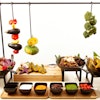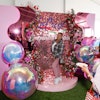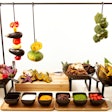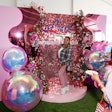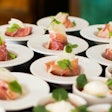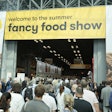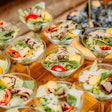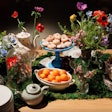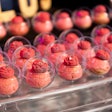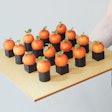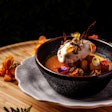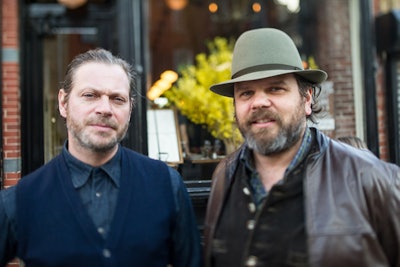
Frank Castronovo and Frank Falcinelli have strong feelings about what it’s like for chefs to cook at tasting events in other cities: “It sucks,” Falcinelli says.
The business partners—who run two acclaimed restaurants in the Carroll Gardens neighborhood in Brooklyn, Frankies Spuntino and Prime Meats, plus another Frankies outpost in the West Village—are looking to improve that situation with their newest project, called Res. It’s an event space in Red Hook, Brooklyn, where the Franks will invite out-of-town chefs to cook and present their ideas to the New York restaurant community in a relaxed, low-pressure environment. The venue includes housing (Res stands, in part, for “residency”) so the chefs have a place to stay as well. Res hosted its first events this summer, and is available for event rentals. (They're also working on a TV show with Vice, and growing their off-site catering business.)
“The model is 150 days of residencies, 150 days of [outside] events, and 60 days of presentations from Frank and myself,” Falcinelli says. We spoke to the Franks about their plans for Res, the international food events that inspired them, and what it’s like to cook at traditional tasting events.
What made you decide to open Res?
Falcinelli: We had accumulated a lot of experience; we had done pretty much what we could do in the restaurant business without being able to contribute to the professional audience and also to the audience of New York. So it came out of wanting to contribute back, and make something that not only wasn't there before but also something refreshing. We've always been interested in the arts, we always saw the art model as a great model. They always call the culinary arts the culinary arts, but [experiencing them] always comes down to an event of some sort. So we tried to figure out, how would you do something without it being an event, but still be an event, and be [more like] the arts?
If you come and present, the model is you come for a week or two or three, and maybe present two or three times in that time. In the meantime they're experiencing New York as any artist would. They come, they receive the press, they receive their peers, they're able to explore New York and really get to know it, and then produce their best work.
What do you want events at Res to feel like?
Falcinelli: Refreshing, inspiring. It shouldn't feel like a catered event.
What has been the response so far?
Falcinelli: We've been traveling and talking about Res for about six months, and every chef that we come in contact with, when they hear the idea, they all want to be a part of it.
Castronovo: They all want to be involved.
We opened up Frankies Spuntino nine years ago. It's a simple Italian restaurant with great food that's healthy and affordable. Anybody in the community can love and enjoy it. Res is giving back to the community in a different way. It's bringing great chefs from anywhere. A lot of people can't go to San Sebastian and eat at Etxebarri or Rekondo. So we're bringing those guys here, and everyone's going to get to enjoy it.
When you spoke on a panel at the Taste Talks in Brooklyn recently, you talked about what it's like for chefs to cook for tasting events—you didn't make it sound very fun.
Falcinelli: Oh, it sucks. It's happening right now, it's happening today. Right now a chef probably just got off a plane, he's running to the hotel, he's seeing if his shit came from UPS or through customs, he's running around looking for equipment. It's sweaty, it's uncomfortable, it's not civilized.
Is that because event people don't understand what it's like to be on that side of the process?
Castronovo: It's because the end result is a different goal from our end result. Our goal is to bring something to enrich the community, to enrich the chefs. It's equally exciting for the chef to be able to do whatever he wants, or she wants. They don't even have to cook. Maybe it's one little taste and an hour and a half of talking.
Falcinelli: It's more about ideas, influence, inspiration. If you get to interact with the chefs it's a little different. Even if you get to go to Noma [the two-Michelin-star restaurant in Copenhagen], you're not going to get to talk to [chef] Rene Redzepi. Chances are it's not going to happen. This is going to be a great thing for the citizens of New York to experience, in a calm, civilized environment.
What do you think event planners should do to make tasting events better—or are those issues just the nature of the beast?
Falcinelli: It's a different model. I don’t think they can afford to.
This is our art-meets-commerce project. When you’re doing a tasting event it’s always a finite period of time. It’s completely different. This is as if you’re coming to Carnegie Hall. You’re staying in the residences, you’re staying for a few weeks—it’s more that type of model. It’s a real artists model.
What food events get it right?
Castronovo: MAD is a food symposium in Denmark hosted by Rene Redzepi. It's three years old, and it's like 500 people. It's growing, it's raw, it's great. It's all talks, sometimes little demos. It's about chefs really understanding and opening up their minds collectively about what we do and how important our role is and how unimportant it is.
Mistura is in Peru. It’s gigantic. It's the largest food festival in South America. It has great food, it has great talks, it's in a beautiful environment. It's a major eye opener.
Mesamerica in Mexico City is two years old. It's hosted by Enrique Olvera, another Michelin-starred chef. That's a little bit like MAD. MAD is not sponsored, but Mesamerica is, so you get a little corporate-ness.
So Res is an attempt to recreate that in a smaller way?
Castronovo: In our very humble way, building it in Red Hook, Brooklyn. Trying to harness that talent and offer it to the New York public.
What about those events appeals to you?
Castronovo: It's not just the [top chefs]. It's also the farmer and the oyster guy. It's the guy who's diving for sea urchins in the Nordic Sea and needs a two-inch-thick wetsuit to go down in subzero temperatures to harvest beautiful little sea urchins that Rene Redzepi exclusively gets. And he gets on the stage and talks about what it's like to get up every morning and go out on a boat in the freezing cold winter.
Falcinelli: You get to meet that guy, and hang out with that guy, and have sidebars with him.
Castronovo: And then Rene had the guy who taught him how to forage, who wants to come and forage in New York, and in Brooklyn, and up the Hudson River, and see what's there. So he has a residency scheduled with us.
How can planners make food events better for chefs and for guests?
Castronovo: The best recent food event I've been involved in was an event in Essex Market. They had 20 chefs and [two tables of 10 for each chef] so you were sitting at this table and eating at Frankies, and the guy at this table was eating at Momofuku, and these people were sitting at Daniel. But they were all together. It was for Edible Schoolyard. Everybody loved it, and we all got to hang out and talk. And you're only cooking for 20 people, so it's easy.
Falcinelli: And it went fast.
(The interview has been edited and condensed.)


